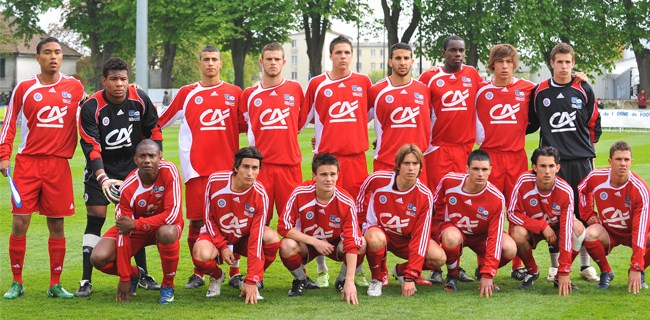Early Wednesday morning – very early – watching Montpellier’s warm-up match against Sporting Kansas City for the Trophée des Champions this weekend, commentator Callum Williams said a couple of things that surprised team FFW. As well as the usual comedy mispronunciations, so MHSC had Deplanche in defence and Fnarr on the wing, he made reference to the departure of star striker Olivier Giroud to Arsenal, the need to replace him, and the disappointment of the Montpellier fans that there had been no big signings.
This was slightly strange, as the first goal had been scored by new signing Gaёtan Charbonnier, new signing Anthony Mounier was linking up nicely with new signing Emmanuel Herrera who got the other two (Mounier having already scored a hat-trick in his first match and set up Camara and Herrera to score against Arles-Avignon and Nice respectively), and new signing Daniel Congré was putting in a solid shift in defence.
The point, Williams continued, was that MHSC had not made any big-name signings, and compared their situation to that of PSG, who have so far this summer brought in Lavezzi, Verratti, Thiago Silva, and that man Ibra. Cue hollow laughter, for two reasons. First, PSG are rolling in cash after last year’s takeover by QSI, so they can spend an estimated €99 million on marquee signings; second, that is their strategy, to buy established stars in the hope of an immediate return, instead of the slow and steady development approach (Robert Smithson has written on that issue here). Montpellier differ on both of those sides of the transfer window pane.
Montpellier is not a rich club. The €15 million banked for the Giroud has been carefully spent, with the outlay on the four new signings totalling an estimated €13 million, and existing players having contracts renegotiated for higher salaries. Key players such as Younes Belhanda and Henri Bedimo have extended their contracts, and while captain and central defender Mapou Yanga-Mbiwa is the subject of much interest, most recently from Milan, the core of the group that won last year’s Championnat will stay together. This careful cash-management reflects that of last summer, when La Paillade’s business was €2 million in for Spahic, €2 million out for Bedimo, a good bit of business in anyone’s book.
The second point is also key – development. Montpellier Manager René Girard has a history in youth football; before joining La Paillade, he managed the French U19, U16 and U21 teams, and has brought that experience to bear in his club role too. When speaking of the French national team, there is the ‘Génération 87’, the U17 European Champions of 2004, including Karim Benzema, Samir Nasri and Hatem Ben Arfa; for Montpellier, there is ‘Génération 90’, the group that took the Coupe Gambardella in 2009.
Looking at Montpellier’s first team now, there are ten players who played a part in that victory; three are established members of the team, playmakers Younes Belhanda and Rémy Cabella, and defender/defensive midfielder Benjamin Stambouli, all of whom have gone on to win international caps, Belhanda with Morocco and the others key to the French U21 side. The other seven look to be an important part of Montpellier’s future, strengthening a squad that will be fighting on four fronts this year.
Striker Bengali Fodé Koita made four substitute appearances in the run-up to Christmas and was then loaned to Lens for the rest of the season, where he scored three goals in 17 appearances. In midfield, Guillame Legras played 30 games on loan to Martigues, Jonas Martin scored three in 26 for Amiens, and Adrien Coulomb went to Vannes. In defence, Teddy Mézague scored three in 28 for Martigues, while Abdelhamid El-Kaoutari made five Ligue appearances for Montpellier. There is also goalkeeper Jonathan Ligali, the final member of the Gambardella squad now to be integrated into the first team.
It doesn’t stop there – 23-year old attacker Jonathan Tinhan came in from Grenoble last summer where he had scored three in 20 the previous season, coming on four times for Giroud and scoring the equaliser away at Dijon, and there have been four promotions from the reserves: defensive midfielder Bryan Dabo, defender Mathieu Deplagne, attacker Abdoul Karim Sylla, and goalkeeper Baptiste Valette. All the outfield players bar El-Kaoutari (currently with the Moroccan Olympic squad) have been involved in the pre-season matches, Koita scoring against Nice, Sylla and Tinhan setting up goals against Arles-Avignon, Deplagne and Mézague appearing in defence against Sporting KC.
Thus, Montpellier are not splashing the cash, as they can’t – but more importantly, they are not scrabbling around in desperation as a result; rather they are buying sensibly, with a view to strengthening and deepening the squad, and bringing through youth players who have been given playing time by going out on loan. They may not be about to buy Kaka, but overall their approach cannot be said to be disappointing.
The first test of La Paillade sans Giroud will be the Trophée des Champions this Saturday against Olympique Lyonnais, and it will only get harder from there, trying to defend a Ligue 1 title against the spending power of PSG, and making a debut in the Champions League in what will no doubt be une poule de la mort, but Montpellier have made a virtue of their financial position. Who knows, in a few year’s time, it may be ‘Génération 90’ who are the stars.
Philippa B can be found on Twitter, and has previously analysed Montpellier’s selections for 2011/12 on her blog.

